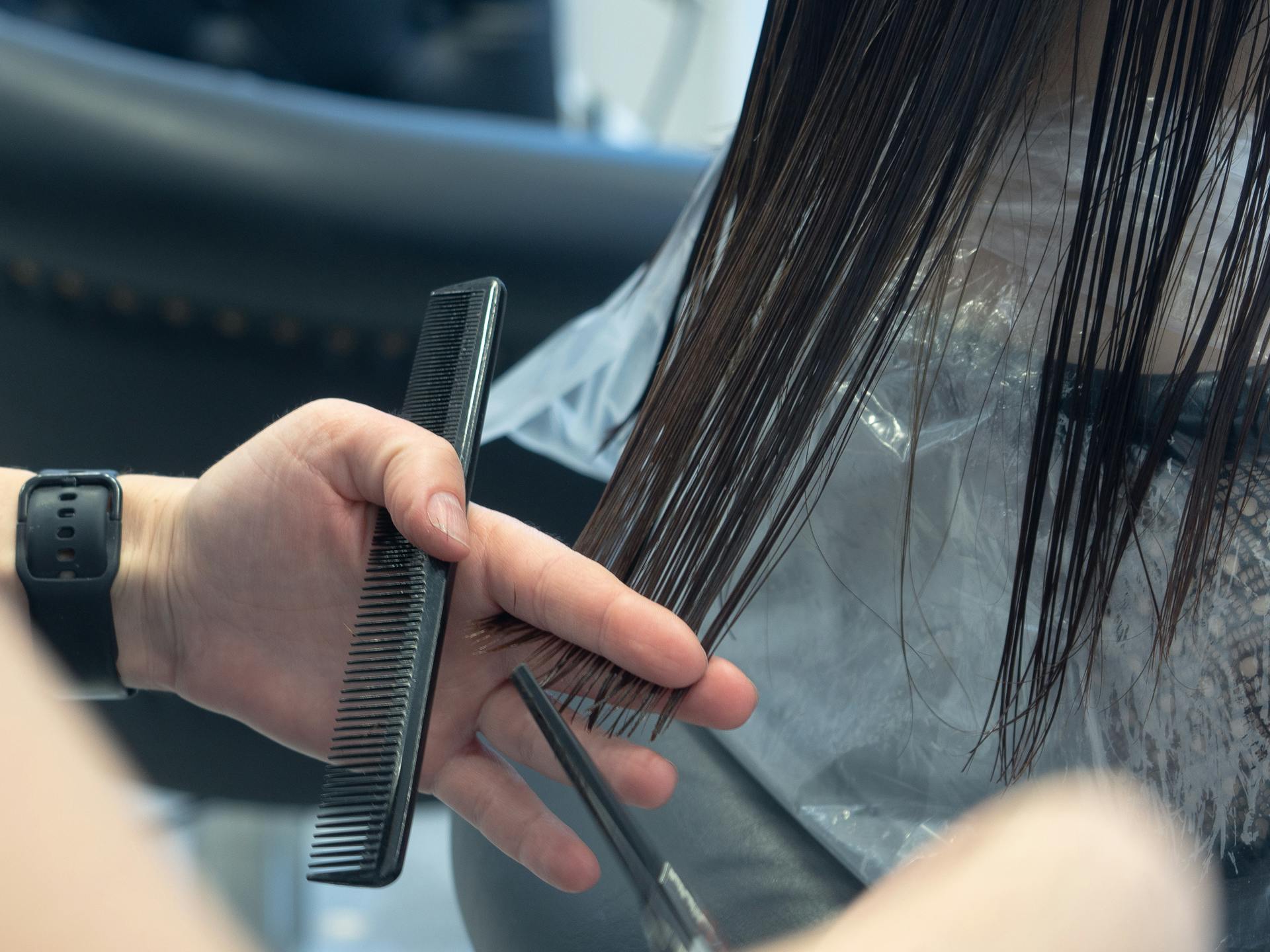
Welcoming a corgi into your family is a big decision, and with their unique needs, it's essential to be prepared. Corgis are prone to obesity, so monitoring their food intake is crucial.
Regular exercise is vital for corgis, with at least 30 minutes of daily physical activity recommended. This can be a brisk walk or playtime in the yard.
Corgis are intelligent dogs that thrive on mental stimulation, so engaging them in puzzle toys or obedience training is a great way to keep them happy and healthy.
Consider reading: Why Are Dogs so Careful with Eggs?
General Information
Corgis are a short-legged breed that originated in Wales, UK, and are known for their intelligence and loyalty.
Their average lifespan is around 12-14 years, which is relatively long for a dog of their size.
Corgis are prone to obesity, so it's essential to monitor their food intake and ensure they get regular exercise.
A healthy adult corgi should weigh between 25-38 pounds.
Corgis require regular grooming to prevent matting and tangling of their fur.
They need their nails trimmed every 4-6 weeks to prevent overgrowth.
Corgis are generally good with children if socialized properly from an early age.
However, they can be wary of strangers, so early socialization is crucial.
Corgis are highly intelligent and respond well to positive reinforcement training.
They can learn basic commands and tricks with ease, but may require patience and consistency.
Corgis are a relatively low-maintenance breed when it comes to exercise needs.
A daily walk and some playtime should suffice, but they do enjoy running and playing off-leash.
Health Issues
Corgis are prone to several health issues that can impact their quality of life. One common issue is hip and elbow dysplasia, an inherited disease that causes the joints to develop improperly and results in arthritis.
Stiffness in your Corgi's elbows or hips may become a problem for him, especially as he matures. You may notice that he begins to show lameness in his legs or has difficulty getting up from lying down.
Overweight Corgis may develop arthritis years earlier than those of normal weight, causing undue pain and suffering. Regular exercise and a balanced diet can help prevent or manage this issue.
Some eye problems that can affect Corgis include cataracts, progressive retinal atrophy (PRA), distichiasis, and persistent pupillary membrane. These conditions can cause blindness, pain, or secondary problems if left untreated.
Here are some common eye conditions that can affect Corgis, along with their symptoms and treatment options:
- Cataracts: cloudy lenses, blindness, surgery to remove cataracts and restore sight
- Progressive retinal atrophy (PRA): night blindness, dilated pupils, genetic test available, not curable
- Distichiasis: extra hairs inside the eyelid, corneal ulcers, chronic eye pain, several treatment options available
- Persistent pupillary membrane: small strands of tissue attached to the iris, usually doesn't hurt or impede vision, but can cause secondary problems
Hip and Elbow Dysplasia
Hip and Elbow Dysplasia is a serious health issue that can affect many breeds of dogs, including Pembrokes and Corgis. It's an inherited disease that causes joints to develop improperly, leading to arthritis.
Stiffness in the elbows or hips can become a problem for your dog as he matures. You may notice lameness in his legs or difficulty getting up from lying down.
We can treat arthritis caused by dysplasia, and the sooner we do it, the better. This will help minimize discomfort and pain for your dog.
X-rays of your dog's bones can help identify issues early on. This is especially important for overweight dogs, who may develop arthritis years earlier than those of normal weight.
Surgery may be a good option in severe and life-limiting cases. It's essential to work closely with your veterinarian to determine the best course of action for your dog's specific needs.
Eye
Eye problems can have a significant impact on a Pembroke Welsh Corgi's quality of life, and it's essential to be aware of the potential issues that can arise.
Cataracts are a common cause of blindness in older Pembrokes, and they can be identified by the lenses of the eyes becoming more opaque and cloudy.
Progressive retinal atrophy (PRA) is an inherited disease that can lead to blindness, and it's more common in Corgis than in other breeds. Early symptoms can include night blindness or dilated pupils, typically beginning around three to five years of age.
Distichiasis is a painful condition caused by extra hairs growing inside the eyelid and rubbing on the surface of the eye. If left untreated, it can lead to corneal ulcers and chronic eye pain.
Persistent pupillary membrane is a condition where small strands of tissue meant to disappear after birth remain attached to the iris. While it usually doesn't hurt or impede vision, it can occasionally cause secondary problems.
Here are some common eye conditions that can affect Pembroke Welsh Corgis, along with their potential symptoms and treatment options:
Care and Wellness
Taking care of your corgi's diet is crucial for their overall health. Keep their diet consistent and avoid giving them people food.
Corgis generally have good teeth, and regular brushing can keep them perfect. Brush their teeth at least twice a week, and provide a high-quality diet appropriate for their age.
Regular exercise is essential for corgis. They need daily walks, and their energy level should be matched with their exercise routine. Don't overdo it at first, and provide them with mental stimulation to prevent boredom.
For more insights, see: Best Dog Food for Dogs with No Teeth
Corgis are prone to health problems, so it's essential to secure pet health insurance. This will help cover medical costs and ensure your corgi receives the necessary care.
Here are some specific grooming needs for corgis:
- Brush their coat at least weekly, and daily during shedding season.
- Trim their nails every 2 to 3 weeks to prevent overgrowth.
- Clean their ears weekly, even as a puppy.
- Brush their teeth weekly to maintain oral health.
By following these care and wellness tips, you can help your corgi live a happy and healthy life. Regular check-ups with your veterinarian will also help identify any potential health issues early on.
Spaying and Genetics
Spaying your Corgi decreases the likelihood of certain types of cancers. This is one of the many benefits of spaying or neutering your pet.
Routine blood testing prior to surgery helps identify and take precautions against common problems that increase anesthetic or surgical risk. This is especially important for Corgis.
Spaying also eliminates the possibility of your pet becoming pregnant or fathering unwanted puppies.
Spay or Neuter
Spaying or neutering your dog is one of the best things you can do for their health and well-being. It decreases the likelihood of certain types of cancers and eliminates the possibility of your pet becoming pregnant or fathering unwanted puppies.
In females, spaying means surgically removing the ovaries and usually the uterus, while in males, neutering means surgically removing the testicles. This simple procedure can make a big difference in your dog's life.
Spaying or neutering also gives your vet a chance to identify and address some of the diseases your dog is likely to develop while they're under anesthesia. For example, if your pet needs hip X-rays or a puppy tooth extracted, this would be a good time.
Genetic Predispositions
Genetic predispositions play a significant role in a cat's likelihood of developing certain health issues, such as uterine infections or breast tumors, which can be prevented by spaying.
Some breeds, like the Siamese, are more prone to certain health problems due to their genetic makeup.
Spaying before the first heat cycle can significantly reduce the risk of uterine infections and breast tumors, which are common in intact females.
Cats that are spayed before their first heat cycle are also less likely to develop uterine infections, which can be life-threatening if left untreated.
Here's an interesting read: Dog Care Health
Spaying can also prevent certain types of cancer, including breast tumors, which are more common in intact females.
Intact males are more likely to develop testicular cancer, which can be prevented by neutering.
Spaying or neutering can also reduce the risk of certain behavioral problems, such as spraying or aggression, which can be linked to hormonal imbalances.
Emergency and Infection
Emergency situations can arise at any time, so it's essential to know the signs to look out for. If you notice your corgi scratching or shaking their head, or showing signs of ear discharge, seek medical care immediately.
Some common signs of infection in corgis include bacterial and viral infections such as parvo, rabies, and distemper, which can be prevented through vaccination. Vaccination recommendations will be based on your corgi's age, the diseases prevalent in your area, and other factors.
If you notice any of the following signs, seek medical care right away: scratching or shaking the head, tender ears, or ear discharge; inability or straining to urinate; discolored urine; cloudiness, redness, itching, or any other abnormality involving the eyes; fatigue during exercise, coughing, or shortness of breath; unwillingness to jump, pain, hunched back, paralysis; leg stiffness; reluctance to rise, sit, use stairs, run, or jump; dragging the hind toes or hind limb weakness; or any abnormal shaking, trembling, or excessive involuntary tremors.
For more insights, see: Doberman Ear Cropping Age

A list of emergency signs to watch out for:
- Scratching or shaking the head, tender ears, or ear discharge
- Inability or straining to urinate; discolored urine
- Cloudiness, redness, itching, or any other abnormality involving the eyes
- Unwillingness to jump, pain, hunched back, paralysis
- Leg stiffness; reluctance to rise, sit, use stairs, run, or jump; “bunny hopping”
- Dragging the hind toes or hind limb weakness
- Any abnormal shaking, trembling, or excessive involuntary tremors
Emergencies
If you notice any of the following signs in your pet, seek medical care immediately.
Scratching or shaking the head, tender ears, or ear discharge can be a sign of an underlying issue that needs prompt attention.
Inability or straining to urinate; discolored urine is a clear indication that something is wrong and requires veterinary care.
Cloudiness, redness, itching, or any other abnormality involving the eyes should not be ignored, as it can be a sign of a serious infection.
Fatigue during exercise, coughing, or shortness of breath can be a sign of a respiratory issue that needs to be addressed.
Unwilling to jump, pain, hunched back, paralysis are all serious signs that require immediate medical attention.
Leg stiffness; reluctance to rise, sit, use stairs, run, or jump; “bunny hopping” can be a sign of a neurological issue.
Dragging the hind toes or hind limb weakness are both indicators of a potential problem that needs to be evaluated by a veterinarian.
Here's an interesting read: Pitbull Dog Signs

Here are some key signs that require immediate attention:
- Scratching or shaking the head, tender ears, or ear discharge
- Inability or straining to urinate; discolored urine
- Cloudiness, redness, itching, or any other abnormality involving the eyes
- Unwilling to jump, pain, hunched back, paralysis
- Leg stiffness; reluctance to rise, sit, use stairs, run, or jump; “bunny hopping”
- Dragging the hind toes or hind limb weakness
Infections
Pembroke Welsh Corgis are susceptible to bacterial and viral infections, such as parvo, rabies, and distemper, which are the same ones that all dogs can get.
Many of these infections are preventable through vaccination, which we will recommend based on her age, the diseases we see in our area, and other factors.
These infections can be serious and even life-threatening if left untreated, so it's essential to take preventative measures.
Regular vaccination is a crucial step in protecting your Pembroke Welsh Corgi from these infections.
Cardigan Welsh Corgis are also susceptible to bacterial and viral infections, such as parvo, rabies, and distemper.
Infections can be prevented through proper care and attention to your dog's health, including regular veterinary check-ups and a balanced diet.
Vaccination schedules will vary depending on your dog's age, health, and lifestyle, so it's best to consult with a veterinarian to determine the right plan for your Pembroke Welsh Corgi.
Curious to learn more? Check out: Maltipoo Age Chart
Cardigan Corgi Specifics
The Cardigan Welsh Corgi is a big dog in a small package, enjoying herding and agility activities as well as quality time with her family.
Cardigans are known for their short, easy-to-care-for coat, but they do shed quite a bit. They're also prone to boredom and separation anxiety when left alone, so they need a lot of activity and mental stimulation to avoid boredom vices.
Here are some specific characteristics to keep in mind:
- Good with kids and other pets
- Easily motivated and trainable
- Devoted, loyal, and protective
- Even-tempered; adapts to a wide variety of environments
- Vigilant watchdog with a ready bark
However, Cardigans can also be willful and stubborn if you don't show strong leadership, and they have a tendency to herd, including small children. They're also standoffish toward strangers.
Breed History
The Pembroke Welsh Corgi's distant cousin, the Cardigan Welsh Corgi, has a rich history that spans centuries. The breed originated in Wales in the 1100s.
The word "corgi" means "dwarf dog", which accurately describes this breed. The exact ancestry of the Cardigan Welsh Corgi is often debated, but it's believed to have originated from a combination of spitz-type breeds brought to Britain with the Vikings.
If this caught your attention, see: Corgi vs Welsh Corgi
The breed's original purpose was to herd sheep and lead them by biting their legs. This working dog was also used as a watchdog, guard dog, and herder.
In the 1930s, the Pembroke Welsh Corgi gained popularity when King George VI gifted one to his daughters Elizabeth and Margaret. The Pembroke Welsh Corgi's popularity has waned slightly over the years, but it remains a beloved breed.
Recommended read: Corgi Dog Breed Photos
Breed Appearance
The Cardigan Corgi's physical appearance is quite distinctive. Its body is longer than it is tall, giving it a low-to-the-ground stance.
Cardigan Corgis have big, upright ears and a nub for a tail, which adds to their unique look.
Their eyes are dark brown with black rims, giving them an observant gaze.
The Cardigan Corgi's build is sturdy, allowing for maximum speed and flexibility.
Despite their low body height, they are quite effective at herding and maintain excellent drive.
Their coat is dense and medium-length, with a water-resistant undercoat.
The outer coat is coarse, long, and straight, with coat colors ranging from black and tan, fawn, red, to sable with white markings.
Their head has a foxy-looking appearance, with a fairly wide and flat skull between the ears.
Their nose is black and fully pigmented, and their mouth has the inner side of the upper incisors touching the outer side of the lower incisors.
Your Cardigan
Your Cardigan Welsh Corgi is a unique and loving companion. They're known for being good with kids and other pets, making them a great addition to many families.
Cardigans are easily motivated and trainable, which means they can learn quickly with positive reinforcement. They're also devoted, loyal, and protective of their loved ones.
However, Cardigans can be prone to boredom and separation anxiety when left alone, so it's essential to provide them with plenty of mental and physical stimulation. This can include activities like herding and agility training.
Cardigans have a short, easy-to-care-for coat, but they do shed quite a bit, especially during their bi-annual blowouts. Regular brushing can help manage this, especially during these times.
One thing to keep in mind when caring for your Cardigan is their tendency to herd, including small children. Supervision is key to ensuring everyone's safety.
Here are some key characteristics to consider when bringing a Cardigan into your family:
- Good with kids and other pets
- Easily motivated and trainable
- Devoted, loyal, and protective
- Prone to boredom and separation anxiety
- Willful and stubborn if not shown strong leadership
- Needs plenty of activity and mental stimulation
- Has a tendency to herd
- Sheds quite a bit
- Standoffish toward strangers
By understanding these traits and needs, you can provide your Cardigan with the love, care, and attention they deserve.
Similar Breeds
If you're considering bringing a new furry friend into your family, you might be wondering about similar breeds to corgis.
The Pembroke Welsh Corgi's close cousin, the Cardigan Welsh Corgi, is another intelligent and energetic breed that requires regular exercise to stay happy and healthy.
Both corgis and Shetland Sheepdogs are known for their herding instincts and short stature, but Shetland Sheepdogs are generally smaller and require less food.
Expand your knowledge: Pembroke Welsh Corgi Information
Corgis and Australian Cattle Dogs share a strong work ethic and high energy levels, but Australian Cattle Dogs require more exercise and training to keep them mentally stimulated.
If you're looking for a breed that's similar to corgis but with a more laid-back attitude, you might consider the Swedish Vallhund.
See what others are reading: Australian Cattle Dog Herding Dogs
Frequently Asked Questions
Are Corgis OK to be left alone?
Corgis can tolerate some alone time, but it's essential to meet their needs before and after leaving them alone. With proper preparation, you can leave your corgi confident they'll be okay.
What not to do with Corgis?
Don't neglect Corgis' grooming needs, as their thick double coat can easily mat and cause skin irritations if not brushed regularly.
Are Pembroke Corgis high maintenance?
Pembroke Corgis require regular grooming and exercise, but they are not high maintenance in terms of effort or stress. With proper care, they can thrive and bring joy to their owners.
Are Welsh Corgis high maintenance?
No, Welsh Corgis are considered low-maintenance house dogs, but they do require regular grooming to care for their thick coats.
Are Welsh Corgis good house dogs?
Welsh Corgis can make excellent house dogs if provided with attention, affection, and proper training. They thrive in environments where they can be loyal and well-behaved companions to their family.
Sources
- https://www.thewaggintrain.com/services/dogs/breeds/pembroke-welsh-corgi
- https://www.vidavetcare.com/dog-breed/pembroke-welsh-corgi/
- https://www.7hillsvet.com/services/dogs/breeds/pembroke-welsh-corgi
- https://www.countrysideveterinaryclinic.org/services/dogs/breeds/cardigan-welsh-corgi
- https://wagwalking.com/breed/pembroke-welsh-corgi
Featured Images: pexels.com


